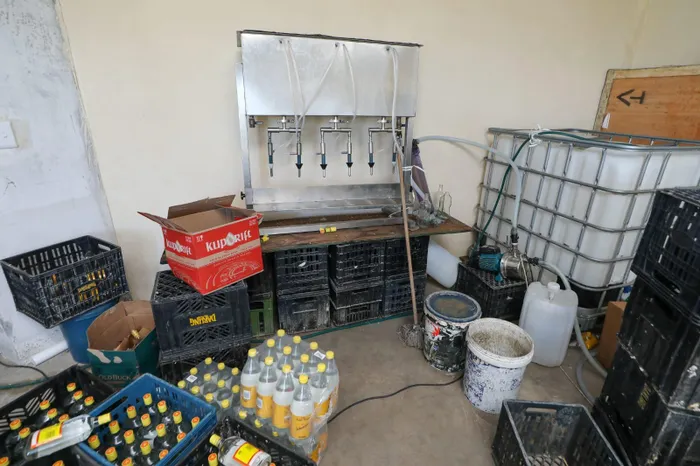
A counterfeit alcohol operation bust in the Western Cape by police. Illicit alcohol trade in South Africa is not only draining billions from the economy but also posing serious public health risks.
Image: SAPS
Illicit alcohol is draining billions from South Africa’s fiscus, threatening public health, and feeding criminal networks, yet industry leaders warn that policy gaps and weak enforcement continue to let the trade flourish.
The Beer Association of South Africa, the Drinks Federation of South Africa, and the South African Liquor Brand Owners Association say urgent coordination is needed.
They are calling for “stronger enforcement, to shut down criminal networks,” and for “clear, coordinated messaging, so that consumers, government, and stakeholders understand the risks and scale of the problem.”
The associations also caution that regulations should not inadvertently drive consumers into the black market.
“It’s about balancing regulation with practicality, ensuring policies reduce harm and protect revenue, instead of fuelling the black market.”
A 2025 Euromonitor study highlights the scale of the problem, showing that “illicit alcohol now makes up nearly 18% of South Africa’s total market by volume.”
The study further found that “volumes have surged by 55% since 2017”.
The South African Revenue Service (SARS) bore the brunt of this growth, with “an estimated R16.5 billion in excise duties (excluding VAT) in 2024 alone” lost.
Breaking down the figures, “38% is counterfeit, costing the economy R6.27 billion. 29% is smuggled, costing R4.8 billion. 32% tax leakage from unregulated local production equals R5.3 billion in losses.”
Industry groups argue that these losses represent stolen national resources. “This is money that should be funding hospitals, schools, pensions, and social services. Instead, it fuels criminal networks and deprives the country of vital resources.”
The public health consequences are equally alarming, the groups said. “Counterfeit alcohol often contains toxic, unregulated substances such as methanol, which can cause blindness, organ failure, or death.”
Despite this, affordability keeps demand high. The study found that “illicit alcohol is, on average, 37% cheaper than legal alternatives.”
It also warned that “the scale and sophistication of these operations have grown immensely, and illicit alcohol is now found in both the formal and informal markets in South Africa.”
Consumers are aware of the dangers but still purchase these products.
Survey results show that:
Related Topics: